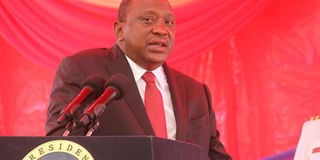The problem of small businesses lies with our politics, not policy

President Uhuru Kenyatta addresses delegates at the Small and Medium Enterprises Presidential Roundtable at Strathmore University on October 16, 2018. PHOTO | MARTIN MUKANGU | NATION MEDIA GROUP
What you need to know:
- We must be a people that realise that politicians are driven by self or vested interest.
- Let them scream from the rooftops all day and conspire and connive all night, but let businesses flourish all the time.
- Civil servants allowed their independence and freedom to construct and implement blueprints from party political standpoints.
In a fit of pique, President Kenyatta last week declined to read his prepared speech for a Nairobi seminar for small and medium-scale enterprises.
It would appear his official remarks would have been at odds with what he had heard from the horse's mouth — the tribulations of the actors in the SME sector and especially as regards infrastructure (power, water, drainage, access, sheds). The gap between the feel-good, civil service-sourced and State House-scripted official speech and the feel-glum and hardscrabble reality of businesses on the ground shamed the President.
POLITICS-HAPPY
He conceded that government had let down SMEs; its officers had not visited with the entrepreneurs; the promises made to them in 2014 had not been met.
It was a rare, public and grovelling admission of failure made in the governing Jubilee Party's heartland that is the populous Eastlands enclave in the capital Nairobi.
But how does this fit in with my promise last week to write about the civil service and politics? Come with me.
One, because I argue we are a 24/7 politics-happy people, we must balance that with, or against, being an all-day, all-night and all-year economically productive people. We must politick 24/7 and produce 365 days a year.
VESTED INTEREST
Two, therefore, we must force government, county and national, to work for us in terms of creating the environments necessary, conducive and facilitative of small, medium and big business to emerge, grow and proliferate.
This way today's small businesses, the backbone of many a household, regional and national economy, will be tomorrow's multinationals.
Three, we must be a people that realise that politicians, their visible and vocal, as well as invisible and unheard, handlers and ubiquitous sycophants, are driven by self or vested interest.
Let them scream from the rooftops all day and conspire and connive all night, but let businesses flourish all the time and everywhere to create wealth and grow the economy.
IMPARTIALITY
And, four, this is what brings me to today's topic — the criticality of the civil service and the centrality of its independence and neutrality in the performance of its function. The civil service is the engine, kitchen and dynamo of government.
It is the service that reads, breaks down, interprets and translates a political party's manifesto and legislation when in government into actionable and workable policies and blueprints and then implements them.
It is the service that ensures the continuity and stability of government by its loyalty to the current government, confidence of the non-government parties and actors in its impartiality and commitment to country.
Parties and governments come and go but the service is permanent; always primed to serve the next government with the same loyalty and professionalism as it did the last one.
IMPLEMENTATION
The service does not serve a party. It loyally serves the government formed by the winning party and that serves the entire country irrespective of how individuals, communities or regions voted.
There are four actors in the President’s lament at Gikomba last week: the politicians who made promises; the governments which failed SMEs; the civil servants who did not visit with them; and the SMEs which seek to create wealth.
There is a missing link in the chain beginning with translating promise to policy and blueprint, creating the necessary environment and then implementing the plans. Was there policy and communication between government and service on the same and its implementation?
EXPERIENCED
Kenya’s civil servants work their socks off; they respect their seniors and serve loyally; and they have a corpus of vastly experienced senior officers who advise and are capable of influencing their politically appointed bosses on policy.
It is ministers, who were politicians, and now cabinet secretaries, who are supposed to be apolitical, and administrative secretaries, who are mostly politicians, who confuse and conflate the work of civil servants.
ENVIRONMENT
I think the problem of SMEs may lie with politics and not policy. But the President was of the view that the various State agencies involved in SMEs had not developed the enabling environments for small-scale businesses to thrive.
The political matters must be discussed and dispensed with at next month’s meeting called by the President and civil servants allowed their independence and freedom to construct and implement blueprints from party political standpoints.





